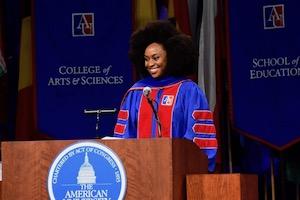Alumni
Congratulations, CAS Class of 2019! Chimamanda Ngozi Adichie Calls Graduates to Act, Change the World

Award-winning writer and speaker Chimamanda Ngozi Adichie received an honorary degree and delivered an inspirational address to the College of Arts and Sciences at the 137th commencement ceremony at American University on May 11, 2019.
In all, 506 students earned bachelor’s, master’s and doctoral degrees in fields from economics to literature, history to neuroscience, arts management to public health. The student speaker this year was Charlie Everett, a Frederick Douglass Distinguished Scholar and president of AU PRIDE, the largest LGBTQ organization on campus. Everett was introduced by College of Arts and Sciences Dean Peter Starr, who congratulated the class of 2019 on all their accomplishments, from cutting-edge research on the LIGO Collaboration’s Nobel Prize-winning detection of gravitational waves, to prestigious internships at the World Bank and Smithsonian Institution, to winning Fulbright, Hollings, Gilman, Killam, NSF Graduate Fellowship, and Critical Language Scholarship competitions.
